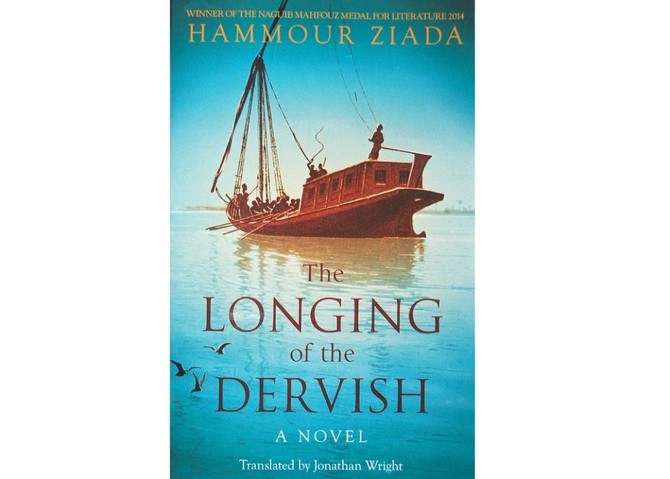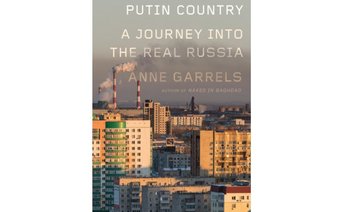“The Longing of the Dervish” by Hammour Ziada is a captivating historical novel set in 19th century Sudan during the uprising of a Sudanese religious leader who declared himself as the Mahdi — or guided one — against the Ottoman Empire and the English-Egyptian government in Cairo. The book was first published in Arabic in 2014 and was shortlisted for the International Prize for Arabic Fiction in 2015. In 2016, it was translated into English by Jonathan Wright, an award-winning translator.
The reader is quickly introduced to Bakhit Manzil, a Sudanese man from the city of Omdurman and an ex-soldier of the religious leader’s army, who has just been released from prison in Khartoum. Although the shackles are off his feet, Manzil’s freedom is bittersweet.
“Freedom had come to them with the warships and cavalry of the invaders. It was September 1898 and the Egyptian army had entered the country. The Mahdist state was defeated,” an excerpt from the book reads.
Instead of feeling free, Manzil is full of thoughts of revenge. His freedom is tainted and as he passes through the streets of Omdurman, he no longer recognizes the city due to the smell of gunpowder and the bodies on the roadside. Manzil is on a mission and he will not rest until he succeeds in ending the lives of those who ended the life of his beloved.
“If he had succumbed to weakness he would have died years ago, but a man with a debt to love never dies,” the book reads.
Manzil’s story is revealed in flashbacks of his past — from the time he was a slave working for the Europeans, to his bout as a soldier in the Mahdi’s army, to his experience as a slave to the Egyptians and finally as a man who was deeply in love with a woman who neither acknowledged his love nor admitted that her feelings matched his. She who had captured his heart was named Theodora, a woman of Greek origin born in Alexandria, Egypt, who moved to Khartoum to serve as a teacher at a missionary school.
The pair meet in the market in Khartoum, he the tall and slim slave of an Egyptian master and she the beautiful Christian with chestnut hair. However, their acquaintance is doomed from the start as Khartoum undergoes political change and transforms into an unlikely power.
The novel is multifaceted and the history and politics of Khartoum in the late 19th century severely complicated. While at the heart of Ziada’s book is a beautiful and complex love story, surrounding the romance is a country undergoing deep political, religious and social change.
Ziada’s book is brimming with picturesque scenes of camel caravans carrying missionaries to their churches in Khartoum, turbaned men and desert guides, cityscapes surrounded by mango, lime and guava trees and colorful birds flitting through streets and bazaars filled with men who don fezzes and women who wash their clothes in the waters of the Nile. Ziada writes beautifully of the landscape and the atmosphere surrounding the uprising of the Mahdi. Ziada’s characters live during a significant time, witnessing the power struggle in North Africa between the Turkish, Egyptian and European powers.
The events in Khartoum at this time are as dramatic as the love story told throughout Ziada’s book. During the uprising of the Mahdi, “everyone remembered the English pasha who had been sent by Cairo some years earlier to fight the Mahdi. The Mahdi’s soldiers killed him in his uniform on the steps of the palace in Khartoum.”
Through stories of the thriving slave trade, Ziada also manages to reveal how deep-rooted racial discrimination was in 19th century North Africa. His book is relevant to the world today, the people and places belong to a different time but the ideology and mentality behind power and human hierarchy remain the same.
Across cultures, religions and races, the reader gets a picture of tolerance, intolerance, prejudice and fear in the region. When the time comes for the Europeans to escape the Mahdi’s army, they say: “This is my country. I’ve forgotten any language other than the Arabic that the people speak here.”
At some points, Ziada’s book shifts tone from the revengeful Manzil to the discoveries of a new and magical land that Theodora and her missionaries arrive in. While there are many things that surprise her and may even seem unpleasant, Theodora grows to love it despite the autumn storms and the strange local traditions.
Ziada’s story encompasses the lives of not just Manzil and Theodora, but everyone — the missionaries, the soldiers of the Mahdi’s army and the inhabitants of Sudan — as they ride the waves of history. Sudan, at the time, did not belong to the people who lived within its borders, but to power and to anyone who was brave enough to fight for it. Many, like Manzil and others, joined military campaigns to avoid starvation, but that starvation was always hot on their heels as military campaigns began and inevitably ended. It was love for other people and the country that kept many moving forward. For Manzil, however, it was love for Theodora.
Ziada’s book is full of history, hope, magic, love and torment and tells an important story that deserves to be heard.
Book Review: A bittersweet Sudanese story of history and hope
Book Review: A bittersweet Sudanese story of history and hope

What We Are Reading Today: Henry V by Dan Jones

In 1413, when Henry V ascended to the English throne, his kingdom was hopelessly torn apart by political faction but in less than ten years, he turns it all around. By common consensus in his day, and for hundreds of years afterward, Henry was the greatest medieval king that ever lived.
A historical titan, Henry V transcends the Middle Ages which produced him, and his life story has much to teach us today.
What We Are Reading Today: ‘Following the Bend’ by Ellen Wohl

When we look at a river, either up close or while flying over a river valley, what are we really seeing?
“Following the Bend” takes readers on a majestic journey by water to find answers, along the way shedding light on the key concepts of modern river science, from hydrology and water chemistry to stream and wetland ecology.
In this accessible and uniquely personal book, Ellen Wohl explains how to “read” a river, blending the latest science with her own personal experiences as a geologist and naturalist who has worked on rivers for more than three decades.
UK writer Samantha Harvey wins 2024 Booker with space novel

- The prize is seen as a talent spotter of names not necessarily widely known to the general public
LONDON: British writer Samantha Harvey on Tuesday won the 2024 Booker Prize, a prestigious English-language literary award, for her novel tracking six astronauts in space for 24 hours.
Harvey’s “Orbital” follows two men and four women from Japan, Russia, the United States, Britain and Italy aboard the International Space Station and touches on mourning, desire and the climate crisis.
The 49-year-old Harvey previously made the longlist for the Booker Prize in 2009 with her debut novel “The Wilderness.”
Harvey dedicated the prize to “all the people who speak for and not against the earth and work for and not against peace.”
Chair of the judges, Edmund de Waal, said “everyone and no one is the subject” of the novel, “as six astronauts in the International Space Station circle the earth observing the passages of weather across the fragility of borders and time zones.”
“With her language of lyricism and acuity Harvey makes our world strange and new for us.”
A record five women were in the running for the £50,000 ($64,500) prize which was announced at a glitzy ceremony in London.
Previous winners include Salman Rushdie and Margaret Atwood.
The prize is seen as a talent spotter of names not necessarily widely known to the general public.
The Booker is open to works of fiction by writers of any nationality, written in English and published in the UK or Ireland between October 1, 2023 and September 30, 2024.
What We Are Reading Today: ‘Dragonflies and Damselflies of the World’ by Klass-Douwe B. Dijkstra

Airily dancing over rivers and ponds, the thousands of colorful dragonfly and damselfly species that cohabit our planet may seem of little importance.
Few life-forms, however, convey the condition of the most limiting resource on land and life’s most bountiful environment as well as they can: While the adults are exceptional aerial hunters, their nymphs are all confined to freshwater.
“Dragonflies and Damselflies of the World” showcases their beauty and diversity while shedding light on how they evolved into the vital symbols of planetary health we celebrate today.
Emirates Airline Festival of Literature announces 2025 lineup

DUBAI: The Emirates Literature Foundation has revealed the speaker lineup and programme details for the upcoming Emirates Airline Festival of Literature 2025, officially marking the countdown to the 17th edition of the event. Set to take place from Jan. 29 to Feb. 3, 2025 at the newly renovated InterContinental Dubai Festival City, the LitFest will offer attendees over 150 incomparable experiences, including fan-favourites: Desert Stanzas, LitFest After Hours, Discovery Talks, and the LitFest Families programme.
Leading the list of authors is US-Indian writer and Stanford University professor Abraham Verghese, author of “The Covenant of Water,” which rose to fame when it was chosen for Oprah Winfrey’s book club.
Other anticipated names include Emmy Award-winning journalist Hala Gorani, the best-selling author and illustrator of the wildly popular “Diary of a Wimpy Kid” series Jeff Kinney, multi-talented author and screenwriter Daniel Handler (also known as Lemony Snicket, creator of “A Series of Unfortunate Events”), Booker Prize-nominated author Chigozie Obioma, best-selling travel writer and author Dr Mohamed Mansi Qandil, scholar and researcher Abdel Illah Benarafa, Cultural Personality of the Year Waciny Laredj, poet and author Khalid Albudoor, and celebrated Palestinian chef and cookbook author Fadi Kattan.
Closer to home, Saudi author Faisal J. Abbas will talk about his new book, “Anecdotes of an Arab Anglophile,” a witty and thoughtful take on what it is like being an Arab in London.
“As we navigate a world of uncertainty and change, the Emirates LitFest serves as a vital platform for dialogue, understanding, and reflection,” said Ahlam Bolooki, CEO of Emirates Literature Foundation, Director of Emirates Airline Festival of Literature, and Managing Director of ELF Publishing.
“Global conversations around identity and culture have never been more crucial, and we are honoured to welcome literary icons from across the globe whose works speak to the heart of these issues. Through our Festival’s dynamic programme, sessions that are set to inspire future generations and events that celebrate our shared experiences, we are building a community based on empathy and understanding. Now, more than ever, we need stories that connect us to our shared humanity, and the Emirates LitFest is where those stories happen” she added.
Dubai Culture is sponsoring this year’s Emirati Strand, which celebrates the culture of the UAE and provides an opportunity for Emirati and international authors to grace the Emirates LitFest stage together. The Emirati Strand features a diverse range of experiences and a distinguished line-up of Emirati writers including poet Adel Khozam, Dr Noura Alkarbi, artist Asmaa Al-Remithi, poet Ali Al-Shaali, author and scholar Salha Ghabish, author and trainer Hamdan Bin Shfayan Alameri, author Nadia Al Najjar, filmmaker Nahla Al Fahad, and many more.
“With everything going on in the world, now more than ever, we need stories. We need human connection. We need to come together in the ‘sanctuary of dreams’ … which the festival offers,” Tamreez Inam, head of programming, told Arab News.
“The festival welcomes people who want to dream and imagine a world that celebrates our shared humanity and offers a place where people can tell their own stories, find themselves in other stories and connect at that very human level. And I think that’s why the 2025 festival is so important; it’s needed more than ever now,” she added.
Dania Droubi, the festival’s chief operating officer, revealed that the event will also host an international youth program.
“We have 150 university students from around the world coming to participate in our program, and they are going to be here in Dubai,” she said.
“They’re all students who speak Arabic and who study Arabic. They are going to be here to meet with another 150 from the UAE-based universities, and they’re here to attend and see the authors and the speakers … and just participate in these discussions, because the youth are the future.”
For information on the full programme and tickets, visit https://emirateslitfest.com.


















